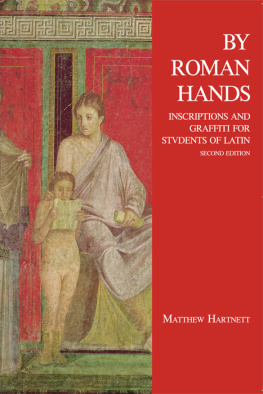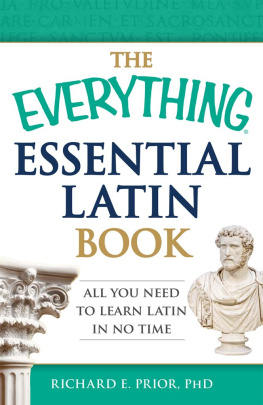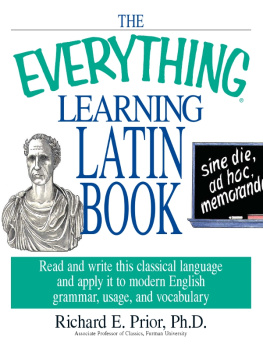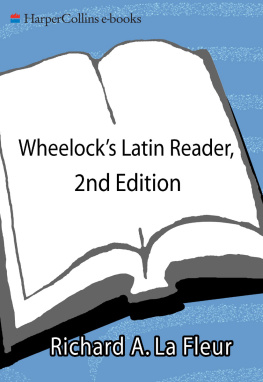
Introduction
Whether you are starting to learn Latin for the very first time, brushing up on topics you have studied with a tutor, or revising for public exams, Collins Latin Language and Roman Culture is here to help. This easy-to-use guide takes you through all the basics you will need to read and understand classical Latin.
Collins Latin Language and Roman Culture is made up of three main parts: 1) .
Newcomers can sometimes struggle with the technical terms they come across when they start to explore the grammar of a new language. explains how to get to grips with all the parts of speech you will need to know, using simple language and cutting out jargon.
This part of the book is divided into sections, each dealing with a particular area of grammar. Each section can be studied individually, as numerous cross-references in the text point you to other relevant sections of the book for further information. Exercises (with answers at the back of the book) are included with all the sections to help you practise what you have learnt.
Every major section begins with a brief explanation of the area of grammar covered on the following pages.
What is a verb?
A verb is a doing word which describes what someone or something does, what someone or something is, or what happens to them (for example, write, is, be eaten).
Each grammar point is followed by simple Latin examples, complete with English translations, helping you understand the rules. Bold and underlined text has been used throughout to highlight the grammatical point being explained.
If you are telling somebody NOT TO DO something, you use the imperative form of nlle followed by the infinitive.
puer, istum potamaudre nlte!
Boys, do not listen to that scandalous poet!
In Latin, as with any foreign language, there are certain pitfalls which have to be avoided. Tips throughout the sections are useful reminders of the things that often trip learners up.
 T IP
T IP
Remember that you NEVER use the verb esse to translate was or were in forms like was reading or were walking and so on. You change the Latin verb ending instead.
Key points sum up all the important facts about a particular area of grammar, to save you time when you are revising and help you focus on the main grammatical points.
K EY POINTS
Negatives indicate when something is not happening or is not true. Latin uses adverbs like nn (or haud) to indicate this, as well as certain nouns and adjectives.
Two negatives used in the same sentence make it affirmative.
Latin does not use et nn but nec.
Latin does not generally use nn with the subjunctive but n.
The literature that survives from Roman times allows us to appreciate what was so special about Roman civilisation and how it has had such an enormous influence on our own world. Latin Literature is made up of ten units, each illustrating the work of a particular Latin writer.
Each unit gives a flavour of the best of this remarkable literature in the original Latin, grouped into themes under English headings to help you navigate through them. Short introductions and numbered English translations of every extract help you understand the original Latin. These translations are deliberately quite literal and for every extract there is a section headed Nota Bene which explains the most important grammatical features. For further help with understanding the literature, a free download with all the original Latin extracts recorded is available on www.collinslanguage.com/latin-audio.
Appreciating Roman civilisation isnt just about linguistic competence its also about cultural knowledge. For you to get a feel for what life was like in the Roman world, at the end of each unit the Culture Vulture will give you the information you need to gain a deeper insight into the Roman world and its people.
The huge influence of the Latin language continues to be felt in many areas of our lives today. An alphabetical list of over 300 Latin words and phrases that are still used in current English is provided in Latin Legacy. Each expression comes with an English translation and any necessary explanation about its background, as well as a real English example of it being used.
Finally, the supplement at the end of the book contains a summary of the Common uses of the cases and a useful list of over 400 Common principal parts of verbs. As well as a general index, there is also a list of references for the original Latin extracts.
We hope that you will enjoy using Collins Latin Language and Roman Culture and find it useful in the course of your study.
Latin pronunciation
There are some sounds in Latin which need a bit of practice, such as the Latin r, which is much more noticeable than an English r, and the long sound to be heard in words like mns and pns, which is different from the oo sound in an English word like moon.
Silent letters
In English, not all letters are pronounced for example, the b at the end of the word lamb or the e at the end of the word complete. In Latin, there are no silent letters.
Latin vowels
These are the main ways in which Latin vowels are pronounced:
| a | - closer to u as in tut than a as in tat ( am, canis) |
| - ar as in cart (amre, mter) |
| e | - e as in net (centum, facile ) |
| - closer to ai as in aim than ay as in day (cna, sprre) |
| i | - i as in sip (liber, mittere) |
| - ee as in keen (dcere, scut) |
| o | - o as in hot (forum, rogre) |
| - closer to oa as in moat than o as in mobile (ade, nmen) |
| u | - u as in put (bell |














 T IP
T IP